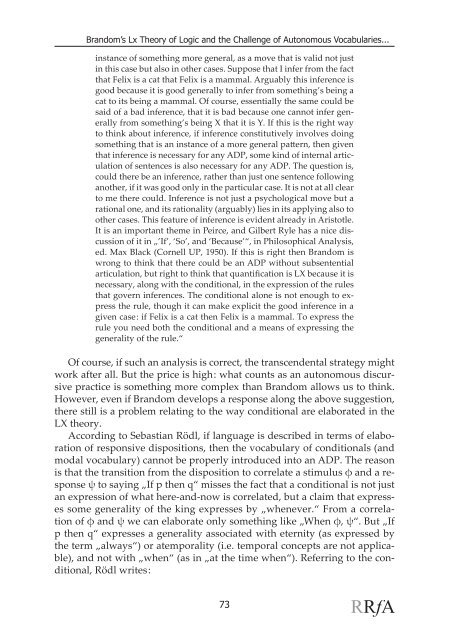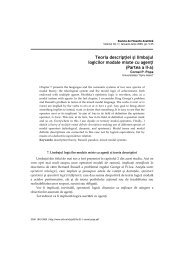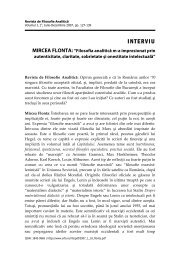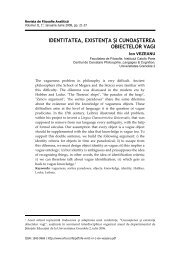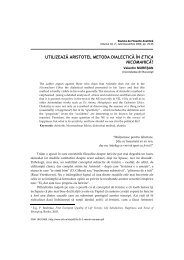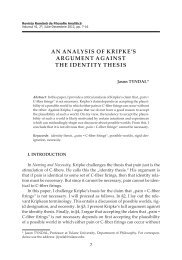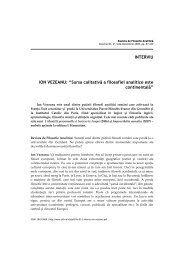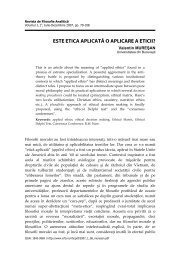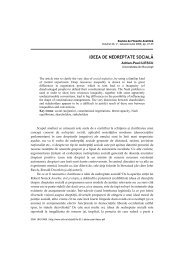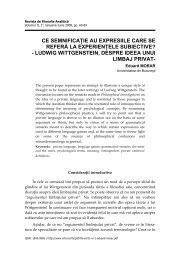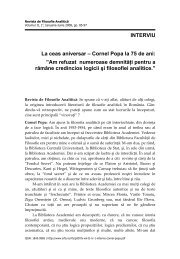brandom's lx theory of logic and the challenge of autonomous ...
brandom's lx theory of logic and the challenge of autonomous ...
brandom's lx theory of logic and the challenge of autonomous ...
Create successful ePaper yourself
Turn your PDF publications into a flip-book with our unique Google optimized e-Paper software.
Br<strong>and</strong>om’s Lx Theory <strong>of</strong> Logic <strong>and</strong> <strong>the</strong> Challenge <strong>of</strong> Autonomous Vocabularies...<br />
instance <strong>of</strong> something more general, as a move that is valid not just<br />
in this case but also in o<strong>the</strong>r cases. Suppose that I infer from <strong>the</strong> fact<br />
that Felix is a cat that Felix is a mammal. Arguably this inference is<br />
good because it is good generally to infer from something’s being a<br />
cat to its being a mammal. Of course, essentially <strong>the</strong> same could be<br />
said <strong>of</strong> a bad inference, that it is bad because one cannot infer generally<br />
from something’s being X that it is Y. If this is <strong>the</strong> right way<br />
to think about inference, if inference constitutively involves doing<br />
something that is an instance <strong>of</strong> a more general pattern, <strong>the</strong>n given<br />
that inference is necessary for any ADP, some kind <strong>of</strong> internal articulation<br />
<strong>of</strong> sentences is also necessary for any ADP. The question is,<br />
could <strong>the</strong>re be an inference, ra<strong>the</strong>r than just one sentence following<br />
ano<strong>the</strong>r, if it was good only in <strong>the</strong> particular case. It is not at all clear<br />
to me <strong>the</strong>re could. Inference is not just a psycho<strong>logic</strong>al move but a<br />
rational one, <strong>and</strong> its rationality (arguably) lies in its applying also to<br />
o<strong>the</strong>r cases. This feature <strong>of</strong> inference is evident already in Aristotle.<br />
It is an important <strong>the</strong>me in Peirce, <strong>and</strong> Gilbert Ryle has a nice discussion<br />
<strong>of</strong> it in „’If’, ‘So’, <strong>and</strong> ‘Because’“, in Philosophical Analysis,<br />
ed. Max Black (Cornell UP, 1950). If this is right <strong>the</strong>n Br<strong>and</strong>om is<br />
wrong to think that <strong>the</strong>re could be an ADP without subsentential<br />
articulation, but right to think that quantification is LX because it is<br />
necessary, along with <strong>the</strong> conditional, in <strong>the</strong> expression <strong>of</strong> <strong>the</strong> rules<br />
that govern inferences. The conditional alone is not enough to express<br />
<strong>the</strong> rule, though it can make explicit <strong>the</strong> good inference in a<br />
given case : if Felix is a cat <strong>the</strong>n Felix is a mammal. To express <strong>the</strong><br />
rule you need both <strong>the</strong> conditional <strong>and</strong> a means <strong>of</strong> expressing <strong>the</strong><br />
generality <strong>of</strong> <strong>the</strong> rule.“<br />
Of course, if such an analysis is correct, <strong>the</strong> transcendental strategy might<br />
work after all. But <strong>the</strong> price is high : what counts as an <strong>autonomous</strong> discursive<br />
practice is something more complex than Br<strong>and</strong>om allows us to think.<br />
However, even if Br<strong>and</strong>om develops a response along <strong>the</strong> above suggestion,<br />
<strong>the</strong>re still is a problem relating to <strong>the</strong> way conditional are elaborated in <strong>the</strong><br />
LX <strong><strong>the</strong>ory</strong>.<br />
According to Sebastian Rödl, if language is described in terms <strong>of</strong> elaboration<br />
<strong>of</strong> responsive dispositions, <strong>the</strong>n <strong>the</strong> vocabulary <strong>of</strong> conditionals (<strong>and</strong><br />
modal vocabulary) cannot be properly introduced into an ADP. The reason<br />
is that <strong>the</strong> transition from <strong>the</strong> disposition to correlate a stimulus φ <strong>and</strong> a response<br />
ψ to saying „If p <strong>the</strong>n q“ misses <strong>the</strong> fact that a conditional is not just<br />
an expression <strong>of</strong> what here-<strong>and</strong>-now is correlated, but a claim that expresses<br />
some generality <strong>of</strong> <strong>the</strong> king expresses by „whenever.“ From a correlation<br />
<strong>of</strong> φ <strong>and</strong> ψ we can elaborate only something like „When φ, ψ“. But „If<br />
p <strong>the</strong>n q“ expresses a generality associated with eternity (as expressed by<br />
<strong>the</strong> term „always“) or atemporality (i.e. temporal concepts are not applicable),<br />
<strong>and</strong> not with „when“ (as in „at <strong>the</strong> time when“). Referring to <strong>the</strong> conditional,<br />
Rödl writes :<br />
73


